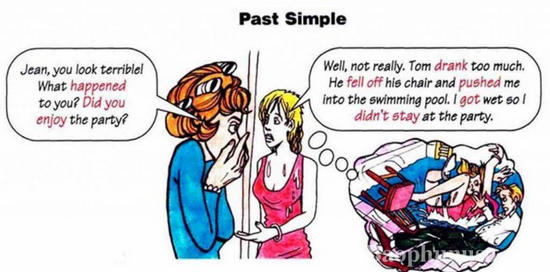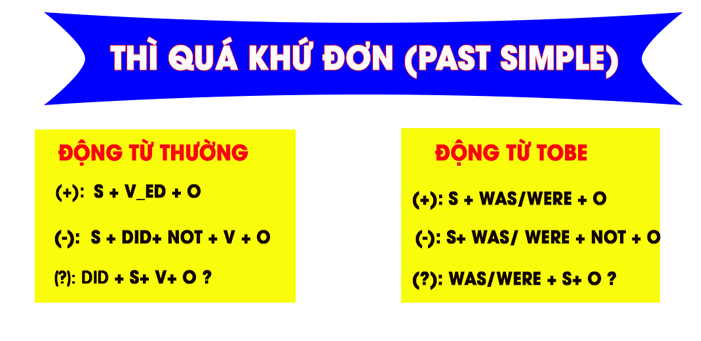The past simple
Join EnglishTopVN to immediately learn important knowledge about SIMPLE PAST Tense with formulas, signs, and exercises with detailed answers. Besides, you need to practice the simple past tense to consolidate your knowledge for all tests.
1. Concepts
Past simple used to describe an action or thing that happened in the past or has just ended.
For example:
➢ We went shopping yesterday. ( Yesterday we went shopping )
➢ He didn’t come to school last week. ( Last week he didn't go to school. )

Example of simple past tense
2. Formula

|
Can |
Verb “tobe” |
Verb “usually” |
|
Confirm |
Formula: S + was/ were + O S = I/ He/ She/ It (singular) + was S= We/ You/ They (plural) + were Example 1: My computer was broken yesterday. Example 2: They were in Paris on their summer holiday last year. (They were in Paris on vacation last summer.) |
Formula: S + V-ed/ VQK (irregular)+ O When conjugating regular verbs in the past tense, we only need to add the suffix "-ed" at the end of the verb There are some verbs that, when used in the past tense, do not follow the rule of adding “-ed”. We need to memorize these verbs. Example 1: She watched this film yesterday.(She watched this movie yesterday.) Example 2: I went to sleep at 11p.m last night. (I went to bed at 11 last night) |
|
Negative |
S + was/were not + Object/Adj For negative sentences, we just need to add "not" after the verb "to be". ATTENTION: – was not = wasn’t – were not = weren’t For example: – She wasn't very happy last night because of having lost money. (She was unhappy last night because she lost money) - We weren’t at home yesterday. (Yesterday we were not at home.) |
S + did not + V (infinitive) In tensepast simple negative sentence. We borrow the auxiliary verb “did + not” (abbreviated as “didn’t), the verb follows in the infinitive form.) Example 1: He didn’t play football last Sunday. (He didn't play football last Sunday.) Example 1: We didn’t see him at the cinema last night. (We didn't see him at the cinema last night.) |
|
Doubt |
Question: Was/Were+ S + Object/Adj? Answer: Yes, I/ he/ she/ it + was. – No, I/ he/ she/ it + wasn’t Yes, we/ you/ they + were. – No, we/ you/ they + weren’t. For questions, we just need to invert the verb "to be" before the subject. Example 1: Was she tired of hearing her customer’s complaint yesterday? (Is she tired from hearing customers complain yesterday?) Yes, she was./ No, she wasn’t. Example 2: Were they at work yesterday? (Did they work yesterday?) Yes, they were./ No, they weren't. (Yes, they do./ No, they don't.) |
Question: Did + S + V(infinitive)? In the simple past tense with questions, we borrow the auxiliary verb "did" inverted before the subject, and the verb follows in its infinitive form. Example 1: Did you visit Ha Noi Museum with your class last weekend? (Did you visit the Hanoi museum with your class last weekend?) Yes, I did./ No, I didn't. (Yes, I do./ No, I don't.) Example 2: Did she miss the train yesterday? (Did she miss the train yesterday or not?) Yes, She did./ No, She didn't. (Yes, he does./No, he doesn't.) |
3. Identification signs
=> We can easily recognize the Simple Past Tense through the following signs:
➣ In the sentence there are words like:yesterday, ago, last (week, year, month), in the past, the day before, with the past times of day (today, this morning, this afternoon).
➣ In the past, the day before, with the past times of the day (today, this morning, this afternoon).
➣ Ago: a long time ago. (two hours ago: 2 hours ago, two weeks ago: 2 weeks ago…)
➣ at, on, in… (at 6 o’clock, on Monday, in June,…)
➣ When + simple past tense clause: when (when I was a kid,…)
➣ Most appear after as if, as though, it's time, if only, wish, would sooner/rather,… (except for some special cases special.

Example 1: Yesterday morning, Tom got up early; then he ate breakfast and went to school. (Yesterday morning, Tom woke up late, then he had breakfast and went to school)
Example 2: Tom lived in VietNam for six years, now he lives in Paris (Tom lived in Vietnam for about 63 years, now he lives in Paris)
Example 3: The plane took off two hours ago. (The plane took off 2 hours ago.)
4. How to use
➣ Expresses an action that happened once, several times, or never happened in the past
Example 1: He visited his parents last weekend. (He visited his parents last weekend)
Example 2: She went home last Friday. (She came home last Friday)

He visited his parents every weekend
➣ Expresses actions that happened continuously in the past
Example 1: She came home, switched on the computer and checked her e-mails. (She came home, turned on her computer and checked her e-mails.)
Example 2: She turned on her computer, read the message on Facebook and answered it. (She opened the computer, read the Facebook messages and replied to the messages)

She came home, switched on the computer and checked her e-mails
➣ Expresses an action that interrupted an ongoing action in the past
Example 1: When I was having breakfast, the phone suddenly rang. (I went to have breakfast and the phone suddenly rang)
Example 2: When I was cooking, my parents came. (While I was cooking, my parents came.)

When I was having breakfast, the phone suddenly rang
➣ Used in conditional sentences type II
Example 1: If I had a million USD, I would buy that car. (If I had 1 million dollars, I would buy a car)
Example 2: If I were you, I would do it.

If I had a million USD, I would buy that car
5. How to conjugate verbs
➣ We add “-ed” after the verb:
Normally we add “ed” after the verb: For example: Watch – watched / turn – turned/ want – wanted/ attach – attached/...
➣ Verbs ending in “e” -> we just need to add “d”:
For example: type – typed/ smile – smiled/ agree – agreed
➣ Verbs have ONE syllable, ending in ONE consonant, preceded by ONE vowel -> we double the last consonant and add "-ed".
For example: stop – stopped/ shop – shopped/ tap – tapped/
Exceptions are some words that do not apply that rule: commit – committed/ travel – traveled/ prefer – preferred
➣ Verbs ending in “y”:
- If before "y" is ONE vowel (a,e,i,o,u), we add "ed".
For example: play – played/ stay – stayed
- If there is a consonant before “y” (the rest) we change “y” to “i + ed”.
For example: study – studied/ cry – cried
➣ How to pronounce "-ed":
| Read as /id/ | when the ending of the verb is /t/, /d/ |
| Pronounced /t/ | when the ending of the verb is /ch/, /s/, /x/, /sh/, /k/, /f/, /p/ |
| Pronounced as /d/ | when the end of the verb is the remaining consonants and vowels |
➣ Some irregular verbs do not add "ed".
There are some verbs that do not follow the rule of adding "ed" when used in the past tense. We need to memorize these verbs ourselves, there are no conversion rules. Here are some irregular verbs:
|
Infinitive verb |
|
Means |
|
go |
went |
Go |
|
see |
saw |
see |
|
smell |
smelt |
People |
|
drive |
drove |
drive |
|
break |
broke |
broken |
|
tell |
told |
tell |
|
speak |
spoke |
speak |
|
say |
said |
speak |
|
hold |
held |
hold |
|
keep |
kept |
holding |
|
take |
took |
take |
|
understand |
understood |
understand |
|
know |
knew |
know |
|
write |
wrote |
write
|

